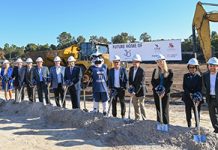Florida Construction News
Construction employment edged up by 2,000 jobs in July, even as overall construction spending fell by 0.4 percent in June, according to new federal data analyzed by the Associated General Contractors (AGC) of America.
The association said developers and project owners appear to be deferring or canceling projects in response to continued uncertainty over tariffs and labor availability.
“Employment growth in construction has slowed over the past year as uncertainty about tariffs and labor availability have caused owners to delay, stretch out, shrink and cancel projects,” said Ken Simonson, the association’s chief economist. “As more structures that broke ground in past years reach completion, it is likely that industry employment growth will taper off even more.”
Total construction employment reached 8.31 million in July, seasonally adjusted — an increase of 96,000 jobs, or 1.2 percent, from July 2024. That marks a sharp slowdown from the 200,000 jobs (3.1 percent) added in the previous 12-month period.
Non-residential construction firms — including building, specialty trade and heavy and civil engineering contractors — added 6,400 jobs in July and 114,400 over the past year, a 2.4 percent gain. Those increases offset losses in residential construction, where employment dropped by 4,400 in July and fell by 18,200 jobs, or 0.5 percent, year-over-year.
Meanwhile, construction spending fell to a seasonally adjusted annual rate of $2.14 trillion in June, down from May and 2.9 percent below the June 2024 level.
Private residential construction dropped 0.7 percent for the month and 6.2 percent compared with a year earlier. Private nonresidential spending declined 0.3 percent in June and 4.0 percent year-over-year. Public construction posted modest growth, up 0.1 percent for the month and 5.2 percent over 12 months.
AGC officials called on the Trump administration to complete more trade agreements and to take a more focused approach to immigration enforcement to avoid additional disruptions to the industry.
“The more uncertainty there is, the less likely developers are going to invest in significant new construction projects,” said Jeffrey D. Shoaf, the association’s chief executive officer. “The more this administration can do to provide economic certainty, the more likely demand for construction will rebound.”
View the employment tables here.







